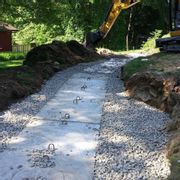
Septic systems feature three main components, including the tank, perforated pipes, and drain field. The drain field, also known as a leach field, plays a vital role in this type of plumbing. Understanding your system and scheduling regular septic maintenance will increase its lifespan and keep it in excellent condition.
How a Drain Field Works
All of the sinks, toilets, and water-using appliances in your home will drain into your septic tank for separation. Solids sink to the bottom of the tank, creating a sludge that slowly decomposes through bacterial enzymes. Scum, or floatable waste such as oil and grease, remains at the top of the tank.
 The middle layer of wastewater exits the tank, traveling through perforated pipes and draining into the leach field. As it seeps through the soil, the water undergoes a natural filtration process when microbes eliminate harmful particles. By the time the water hits groundwater reserves, it is clean and ready for reuse.
The middle layer of wastewater exits the tank, traveling through perforated pipes and draining into the leach field. As it seeps through the soil, the water undergoes a natural filtration process when microbes eliminate harmful particles. By the time the water hits groundwater reserves, it is clean and ready for reuse.
Without a functional drain field, wastewater would not be able to flow from the tank efficiently, causing it to overflow. The water would also contaminate the soil without the proper removal of pathogens and other pollutants.
How to Maintain It
Keep your drain field functional by marking its location. This will keep visitors from accidentally parking over top of it, compacting the soil. Compacted soil is unable to filter wastewater properly and will result in pooling and contaminated water on your property.
Avoid planting anything with extensive root systems over the drain field. Since roots naturally look for the nearest water source, their growth can clog the system.
Septic maintenance also calls for mindful flushing and tank cleaning practices. Throw oil, fat, and grease into the garbage. Do not flush anything that will clog the tank or interfere with bacterial breakdowns, such as coffee grounds, feminine products, and paper products such as “flushable” wipes. They do not break down and decompose. Schedule septic cleaning services every three to four years, depending on how much water is used each week and the number of members in your household. And make sure you don’t have a water softener system discharging into your septic tank. The products that soften the water can deteriorate your concrete tank, and the sodium or potassium used for this can disrupt the normal bacteria flora needed in your septic system for proper bacteria and breakdown.
Keep your entire system functional and safe with septic maintenance from Abrahamson Septic. For over 50 years, these skilled technicians have been offering residential and commercial septic services to clients throughout Preston, CT, and the surrounding areas. Call (860) 889-7939 today to request an estimate or learn more about septic maintenance services online.
About the Business
Have a question? Ask the experts!
Send your question

